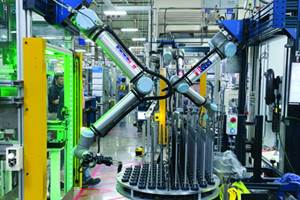The College Question
I think about college at about this time every year. Specifically, I think about my daughter’s education, because tax time is when I see how much money is left over that might go to her college account.
Share









Hwacheon Machinery America, Inc.
Featured Content
View More
.png;maxWidth=45)
DMG MORI - Cincinnati
Featured Content
View MoreI think about college at about this time every year. Specifically, I think about my daughter’s education, because tax time is when I see how much money is left over that might go to her college account.
She is four. It’s an understatement to say that college is a ways off—kindergarten is a ways off. Still, I’ve done the math. Given how much tuition costs today, along with reasonable assumptions for the rate of tuition increase in the future, age four is not too early to be saving.
In fact, because tuition prices are so high relative to what they once were, and because these prices are ascending so rapidly, I wonder if we are reaching a breaking point where college is concerned.
A college education is valuable, no doubt about that. However, the value is not infinite—and the marketplace has a way of innovating. For any good or service, the cost can increase only so far before the market finds some alternative that has a price more in line with its value. When this point comes for college education, our society may quickly get used to some alternative to the traditional college degree. For example, maybe that alternative will involve acquiring an education in strategic bites throughout one’s career instead of facing and financing that education all at once.
I don’t know what form the alternative may take. However, I think we are moving in its direction. Most of you who receive this magazine are managers. How much attention do you give to the details of a prospective employee’s college background? For a skilled position that doesn’t require a 4-year degree, you may actually pay more attention. If there is a technical institute nearby that does good work, then you may take note of that name on the application. For the kinds of positions that call for 4-year degrees, however—even for engineering positions—my guess is that you simply want to see the name of a familiar college among the prospect’s credentials and you want to see a good grade point average and a record of activity at that school. After nodding toward these items, what you really want to evaluate is some pattern of relevant accomplishment that the candidate has demonstrated outside of college. In short, I think it is now generally accepted that college education indicates a basic level of acceptability for a professional position, but otherwise, it says little about an employee’s value.
If that assessment is true, then it is not far to go from just nodding toward a college degree to downplaying the traditional college education altogether. Provided, that is, that the market can one day supply some other means for indicating whether a candidate has the knowledge, intellect and commitment appropriate to a particular job.
Again, I don’t know what that alternative might be. I just think we’re likely to see it.
Manufacturers face particular challenges in the struggle to find quality employees. However, there is an extent to which all employers face this struggle. Students, meanwhile, struggle to fund an education whose relevance and return on investment both increasingly merit scrutiny.
Parties on both sides of the college question are struggling, in other words. That’s why I think it’s possible—just possible—that by the time my daughter is ready for college, students might have the opportunity to experience some new and different approach to college education that represents a welcome, logical departure from what I thought I had been saving for in my daughter’s account.
I’d like to hear from you about this. Not about my daughter’s education (no, no, I couldn’t possibly accept your donations), but instead about your experience with finding the employees you need. This magazine tends to focus on technology, but all of us know that key people are even more important than a plant’s hardware and software. In fact, technology makes key employees more critical, because each stands to deliver so much more value when using the right tools. With this in mind, what have you learned about identifying and cultivating the kinds of employees who are keenly suited to keeping a production process or a manufacturing business performing effectively?
Related Content
4 Steps to a Cobot Culture: How Thyssenkrupp Bilstein Has Answered Staffing Shortages With Economical Automation
Safe, economical automation using collaborative robots can transform a manufacturing facility and overcome staffing shortfalls, but it takes additional investment and a systemized approach to automation in order to realize this change.
Read MoreWhat are Harmonics in Milling?
Milling-force harmonics always exist. Understanding the source of milling harmonics and their relationship to vibration can help improve parameter selection.
Read More6 Variations That Kill Productivity
The act of qualifying CNC programs is largely related to eliminating variations, which can be a daunting task when you consider how many things can change from one time a job is run to the next.
Read MoreTips for Designing CNC Programs That Help Operators
The way a G-code program is formatted directly affects the productivity of the CNC people who use them. Design CNC programs that make CNC setup people and operators’ jobs easier.
Read MoreRead Next
Building Out a Foundation for Student Machinists
Autodesk and Haas have teamed up to produce an introductory course for students that covers the basics of CAD, CAM and CNC while providing them with a portfolio part.
Read MoreSetting Up the Building Blocks for a Digital Factory
Woodward Inc. spent over a year developing an API to connect machines to its digital factory. Caron Engineering’s MiConnect has cut most of this process while also granting the shop greater access to machine information.
Read MoreRegistration Now Open for the Precision Machining Technology Show (PMTS) 2025
The precision machining industry’s premier event returns to Cleveland, OH, April 1-3.
Read More





























.png;maxWidth=300;quality=90)













